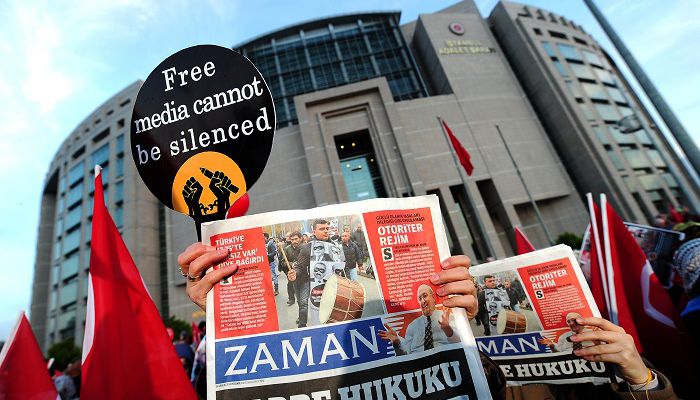Reporters without Borders (RSF), an independent NGO that defends and promotes journalistic freedom and independence worldwide, has described Turkey as being among the top jailers of journalists in its latest report while also noting a decline in the number of incarcerated journalists in the country.
The annual RSF report for 2019 was made public on Monday. The organization put the number of jailed journalists in Turkey at 25, although it is estimated that there are close to 200 journalists behind bars in Turkey. Turkish President Recep Tayyip Erdoğan’s Justice and Development Party (AKP) government stepped up a crackdown on journalists and media outlets critical of it in the aftermath of a failed coup in July 2016.
“Although the number of detained journalists fell for the second year running, Turkey continues to be one of the world’s biggest jailers of media personnel and continues to expose them to an entirely arbitrary justice system,” RSF said.
The RSF report said no judicial decision seems to hold for long in Turkey, giving the case of jailed journalist Ahmet Altan as an example.
“Little more than a week after his conditional release in November, the well-known journalist Ahmet Altan was back in prison again because prosecutors appealed against the decision.”
In a similar development, six Cumhuriyet newspaper journalists – Musa Kart, Güray Öz, Hakan Kara, Önder Çelik, Ahmet Şık and Mustafa Kemal Güngör – were freed conditionally in September only to learn two months later that an İstanbul court had convicted them again at the end of a retrial. Of the six other Cumhuriyet journalists to be prosecuted, only one, Kadri Gürsel, was acquitted. The others could be returned to prison if their convictions are upheld on appeal.
According to the report, dozens of journalists and media representatives were released over the course of the year after completing their prison sentences or as a result of a new court ruling, but around 10 others opted for self-imposed exile in order to avoid an arbitrary trial.
“The risk of prosecution has increased because, as well as the usual charges of ‘terrorist propaganda,’ ‘collaborating with an illegal organization’ and ‘membership of an illegal organization,’ journalists can now also be charged with ‘insulting the president’,” the report said, giving the example of Ozan Kaplanoğlu, a journalist in Bursa and local representative of the Association of Progressive Journalists (ÇGD).
According to the RSF report, 389 journalists were arrested, 57 were held hostage and 49 were killed in connection with their work around the world in 2019. The number killed this year was at its lowest in 16 years.



